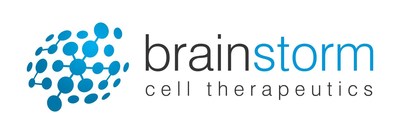BrainStorm to Present Data Linking MRI Measures to Functional Improvement in Progressive Multiple Sclerosis (MS)
On August 25, 2020, BrainStorm Cell Therapeutics (NASDAQ: BCLI) announced the acceptance of a clinical abstract showcasing a correlation between MRI measures and functional improvements in patients with progressive multiple sclerosis (MS). This data will be presented at the MSVirtual2020 meeting on September 11-13. The analysis involved 48 participants and revealed significant differences in MRI data between those with improved versus stable or worsening function, specifically using the 9-hole peg test and timed-25-foot-walk metrics. CEO Chaim Lebovits emphasized the potential implications for clinical outcomes in their ongoing Phase 2 trial of NurOwn®.
- None.
- None.
Insights
Analyzing...
NEW YORK, Aug. 25, 2020 /PRNewswire/ -- BrainStorm Cell Therapeutics Inc. (NASDAQ: BCLI), a leading developer of adult stem cell therapies for neurodegenerative diseases, announced today the acceptance of a clinical abstract documenting an association between magnetic resonance imaging (MRI) measures and functional improvement in patients with progressive multiple sclerosis (MS). The data, to be presented as a poster on September 11-13 at the forthcoming MSVirtual2020 meeting – the eighth joint meeting of the Americas Committee for Treatment and Research in Multiple Sclerosis (ACTRIMS) and the European Committee for Treatment and Research in Multiple Sclerosis (ECTRIMS) – will inform analysis of clinical outcomes in the Company's ongoing Phase 2 trial of NurOwn® (MSC-NTF cells) in patients with progressive MS.

"Although disability improvement is an important measure of function in individuals with progressive MS, the MRI features that correlate with disability improvement had not previously been explored," noted Tanuja Chitnis, M.D., FAAN, Professor of Neurology at Harvard Medical School, Senior Neurologist at Brigham and Women's Hospital, and Director of the Comprehensive Longitudinal Investigations in MS at the Brigham (CLIMB Study). "In this analysis, we have demonstrated a correlation between specific brain and spinal cord MRI measures and observed functional improvements in progressive MS patients. We are grateful to the joint ACTRIMS/ECTRIMS abstract committee for allowing us to present these data, which we hope will facilitate analysis of clinical trial outcomes that specifically evaluate functional improvements in progressive MS."
Dr. Chitnis and colleagues evaluated MRI features of 48 participants in the SysteMS substudy of the CLIMB study, a nested cohort selected to match the inclusion criteria of the Phase 2 NurOwn trial in progressive MS (NCT03799718). The participants underwent brain and lesion volumetric analysis, as well as mean upper cervical cord (MUCCA) analysis, 12-24 months following baseline 3 Tesla MRI. These analyses generated 34 MRI data measures performed by ICOMETRIX, which the investigators compared in patients with improved function versus those with worsening or stable function, as measured by 9-hole peg test (9HPT) or timed-25-foot-walk (T25FW) scores, two well-established measures of function in progressive MS.
Seventeen patients had improved 9HPT scores from baseline to 12-24 months later, compared to 29 with worsened or stable 9HPT scores over that same period. Whole brain volume at baseline (improved 9HPT: 1505±51 vs. stable-worse 9HPT: 1471±62; p=0.069; t-test) and follow-up (improved: 1501.555±52.039 vs. stable-worse: 1461.304±63.562; p=0.03; t-test) differed between the two 9HPT groups, as did gray matter volume at follow-up (improved 1505.059 ±50.961 vs. stable-worse 865.57±41.352; p=0.063: t-test). Eighteen patients had an improved T25FW score, compared to 27 whose score worsened or remained stable over the 12-month period. Deep white matter FLAIR/T2 lesion volume at baseline (improved: 0.43±0.507 vs. stable-worse: 0.827±0.561; p=0.03; t-test) and follow-up (improved: 0.429±0.503 vs. stable-worse: 0.864±0.603; p=0.02) differed between the two T25FW groups. The investigators did not observe any association between MUCCA and functional improvement measures.
Chaim Lebovits, Chief Executive Officer of BrainStorm stated "The important MRI correlations with measures of functional improvement in this matched natural history cohort will provide helpful context as we evaluate the clinical outcomes from our ongoing Phase 2 trial of NurOwn in patients with progressive MS and hopefully bring us a step closer to offering a new treatment option to individuals living with this devastating disease."
About NurOwn®
The NurOwn technology platform (autologous MSC-NTF cells) represents a promising investigational therapeutic approach to targeting disease pathways important in neurodegenerative disorders. MSC-NTF cells are produced from autologous, bone marrow-derived mesenchymal stem cells (MSCs) that have been expanded and differentiated ex vivo. MSCs are converted into MSC-NTF cells by growing them under patented conditions that induce the cells to secrete high levels of neurotrophic factors (NTFs). Autologous MSC-NTF cells can effectively deliver multiple NTFs and immunomodulatory cytokines directly to the site of damage to elicit a desired biological effect and ultimately slow or stabilize disease progression.
About BrainStorm Cell Therapeutics Inc.
BrainStorm Cell Therapeutics Inc. is a leading developer of innovative autologous adult stem cell therapeutics for debilitating neurodegenerative diseases. The Company holds the rights to clinical development and commercialization of the NurOwn technology platform used to produce autologous MSC-NTF cells through an exclusive, worldwide licensing agreement. Autologous MSC-NTF cells have received Orphan Drug status designation from the U.S. Food and Drug Administration (FDA) and the European Medicines Agency (EMA) for the treatment of amyotrophic lateral sclerosis (ALS). BrainStorm has fully enrolled a phase 3 pivotal trial in ALS
(NCT03280056); this trial is investigating repeat-administration of autologous MSC-NTF cells at six U.S. sites supported by a grant from the California Institute for Regenerative Medicine (CIRM CLIN2-0989). The pivotal study is intended to support a filing for FDA approval of autologous MSC-NTF cells in ALS. BrainStorm is also conducting an FDA-approved phase 2 open-label multicenter trial in progressive multiple sclerosis (MS). The phase 2 study of autologous MSC-NTF cells in patients with progressive MS (NCT03799718) started enrollment in March 2019.
For more information, visit the company's website at www.brainstorm-cell.com.
Safe-Harbor Statement
Statements in this announcement other than historical data and information, including statements regarding future clinical trial enrollment and data, constitute "forward-looking statements" and involve risks and uncertainties that could cause BrainStorm Cell Therapeutics Inc.'s actual results to differ materially from those stated or implied by such forward-looking statements. Terms and phrases such as "may", "should", "would", "could", "will", "expect", "likely", "believe", "plan", "estimate", "predict", "potential", and similar terms and phrases are intended to identify these forward-looking statements. The potential risks and uncertainties include, without limitation, BrainStorm's need to raise additional capital, BrainStorm's ability to continue as a going concern, regulatory approval of BrainStorm's NurOwn® treatment candidate, the success of BrainStorm's product development programs and research, regulatory and personnel issues, development of a global market for our services, the ability to secure and maintain research institutions to conduct our clinical trials, the ability to generate significant revenue, the ability of BrainStorm's NurOwn® treatment candidate to achieve broad acceptance as a treatment option for ALS or other neurodegenerative diseases, BrainStorm's ability to manufacture and commercialize the NurOwn® treatment candidate, obtaining patents that provide meaningful protection, competition and market developments, BrainStorm's ability to protect our intellectual property from infringement by third parties, heath reform legislation, demand for our services, currency exchange rates and product liability claims and litigation,; and other factors detailed in BrainStorm's annual report on Form 10-K and quarterly reports on Form 10-Q available at http://www.sec.gov. These factors should be considered carefully, and readers should not place undue reliance on BrainStorm's fo/rward-looking statements. The forward-looking statements contained in this press release are based on the beliefs, expectations and opinions of management as of the date of this press release. We do not assume any obligation to update forward-looking statements to reflect actual results or assumptions if circumstances or management's beliefs, expectations or opinions should change, unless otherwise required by law. Although we believe that the expectations reflected in the forward-looking statements are reasonable, we cannot guarantee future results, levels of activity, performance or achievements.
CONTACTS
Investor Relations:
Corey Davis, Ph.D.
LifeSci Advisors, LLC
Phone: +1 646-465-1138
cdavis@lifesciadvisors.com
Media:
Paul Tyahla
SmithSolve
Phone: + 1-973-713-3768
Paul.tyahla@smithsolve.com
![]() View original content:http://www.prnewswire.com/news-releases/brainstorm-to-present-data-linking-mri-measures-to-functional-improvement-in-progressive-multiple-sclerosis-ms-301117815.html
View original content:http://www.prnewswire.com/news-releases/brainstorm-to-present-data-linking-mri-measures-to-functional-improvement-in-progressive-multiple-sclerosis-ms-301117815.html
SOURCE Brainstorm Cell Therapeutics Inc







